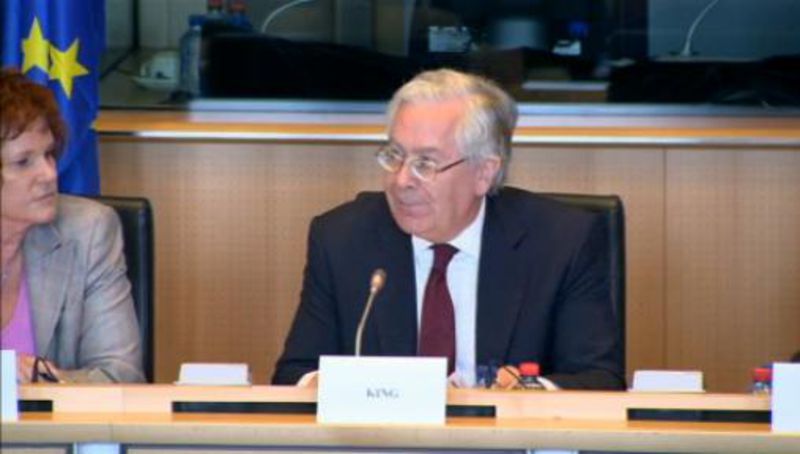Georgi Stoev: The state must withdraw from public services
Adelina Marini, September 17, 2009
 euinside is continuing the discussion on the proposal of the Commission to include additional indicators like environment and social equality to the GDP. Today we are introducing the opinion of the managing partner at the Industry Watch Georgi Stoev. According to him, the inclusion of such indicators in the GDP can only happen if these services become private.
euinside is continuing the discussion on the proposal of the Commission to include additional indicators like environment and social equality to the GDP. Today we are introducing the opinion of the managing partner at the Industry Watch Georgi Stoev. According to him, the inclusion of such indicators in the GDP can only happen if these services become private.
euinside: Is it possible the ecologic indicator to be included in the GDP, like climate change and energy consumption, air pollution, usage and pollution of water, waste generation?
GEORGI STOEV: There are some positive steps in this direction that are being done even now. One of them is the trade or, at least, the opportunity for trade of greenhouse gas emissions. The moment when an ecological problem becomes a commercial one, no matter if it is whale protection or air pollution, when there is right people to trade it, then we can measure the value of the decrease of the respective ecological losses.
For example, if I build a factory in Plovdiv, I poison the land in the neighbouring villages that produce strawberries, I am buying from the farmers the right to poison their land because what I will be producing is more expensive than the strawberries. When such a market is established, then the values of the various decisions in the field of environment can be measured and they will be included in indicators like the GDP, the gross added value or other macroeconomic indicators. But if we try to measure the ecological damages or their reduction through other artificial and more abstract indicators, different from the commercial ones, I think this will be a waste of time.
euinside: As far as I understand from the document of the Commission, the idea is to expand the general picture in such a way that when someone takes a look at the indicators of a country, he will be able to get a real idea of its economic and ecological development because the Commission is binding these two?
GEORGI STOEV: This is great! The problem is that while environment is separated from trade and is a purely regulative issue, of which the politicians are responsible, it has no place in the macroeconomic indicators. This is the basic conclusion. There are many examples around the world how these things can be done. There are environmentalists who offer trade rights over different endangered species, hunting licenses, where there is also trade over the right to kill specific species. In other words, this has already started to develop as practice, but I guess that it would take years because Europe is doing a little bit more slowly those things than the US.
euinside: And regarding the other idea about the social inequality, wealth distribution, an indicator to include education, healthcare, infrastructure? Is it possible to measure these things?
GEORGI STOEV: The problem is that the added value in the various so called public spheres like healthcare, education, pension system, sometimes infrastructure, cleanness of cities etc. traditionally in Europe is considered as a service which the state should provide for and not the private sector like the other mass services. It is considered that the private sector is failing and that is why we should finance those services through taxes so that the state officials could provide them for us. This is where the link breaks between the service in terms of added value for the consumer and the measurement of this value - what quantity as a value do 100 euro add if spent by the government? Because 100 euro spent by an entrepreneur in investments has very different value spent in the economy than is 100 euro is spent by the minister of transport.
So, until we have education and healthcare, dominated fully by the state, we cannot measure exactly how much the added value is in these fields. And here comes the question how accurate we want to measure what is happening as economic activity in these, I prefer calling them industries and other colleagues call them public services? I have always been a supporter of the idea these industries to go back where they belong - in the private sector. In other words - private schools, private kindergartens, private hospitals. It is clear that there will be a small part, so called social, which the state will keep under its wings so as to avoid tension, but in its larger part these services must be private, they must lay on the principles of competitiveness and market. The moment when I can choose where my daughter will study with 500 euro tax per term, I say to the statistics that in fact this school adds 500 euro value per child.
In this very moment the statistics includes this amount of 500 euro in the gross added value indicator. Then this money goes in the GDP and we have a thorough or 90% inclusion of those services. Unless there is no political decision these sectors to be liberalized, we will have to think of some artificial ways to measure the added value in the public sector. For the moment, what is being done is the so called public consumption. It is good that the Commission has come to the conclusion that this value is not measured well but my personal opinion is that unless those sectors become private, we won't be able to measure how much value do add the people that distribute our money.
euinside: And it is very probable that this prevents politicians from taking the right decisions for the development of these sectors in the future, is that correct?
GEORGI STOEV: Wise politicians and relatively literate politicians know that statistics cannot cover the whole life they are trying to regulate. There will always be a field that will remain outside the range of the statistics. And by statistics I mean those official bodies that are created to serve the governments. Of course each private business that is trying to be updated with the latest information, constantly follows the development of the market, gathers statistical information, including macroeconomic data and, if necessary, he or she would order additional research. In fact, the problem we are now discussing is how to serve the government better than the national statistical services and Eurostat.
So the problem remains political because the government will always need numbers to convince the Unions that the prices are growing or the opposite, they would need numbers for the agriculture production so as to face striking farmers, they would need numbers for the prices of labour so as to convince the people in the "Kremikovtsi" plant that they will get more money in another sector, different from metallurgy. In other words, until people stop going out the streets to protest, there will always be shortage of macroeconomic information and there always be cases like the one we discuss. I don't think this will end with the current attempt. Simply, the next one will be in another field.
 | © European Union
| © European Union | © European Union
| © European Union | © European Union
| © European Union